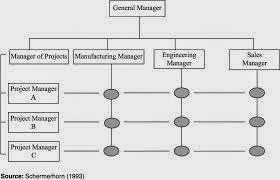KEY TERMS OF MANAGEMENT FROM SCANDINAVIAN STUDIES TO COMMUNICATION NETWORK
1. Scandinavian Studies
-
Development-oriented leader: A leader who is willing to take risks,
experiments, and develops new ideas to accomplish goals.
2. Contingency
Theories of Leadership
-
Fiedler contingency model: States that effective groups require a match
between a leader’s style and his or her subordinates’ personalities.
3.
Cognitive
resource theory:
States that by first making plans, decisions, and strategy, a leader’s
effectiveness is enhanced.
4.
Hersey
and Blanchard’s Situational Theory: States that leadership effectiveness is
greatly influenced by subordinates’ readiness.
Leader-Member
Exchange Theory: States that leaders
form “in” and “out” groups and that individuals in the “in” groups will perform
better than those who are not.
5.
Path-goal theory: States that subordinates accept a leader’s
behavior, as they view it, as a source of satisfaction.
6.
Attribution
theory of management:
Postulates that leadership is an attribution made by individuals of
others.
7.
Charismatic
leadership theory:
A subcomponent of attribution theory that states followers attribute
heroism or extraordinary leadership skills based on observing certain
behaviors.
8.
Characteristics
of charismatic leaders:
•
Self-confidence • Ability to articulate vision
•
Strong convictions about the vision
• Extraordinary behavior •
Perception as an agent of change
• Environment savvy
9.
Transactional
leaders: Those who
are goal-oriented and motivate by clarification of roles and tasks.
10.
Transformational
leaders: Achieve by
providing individualized direction, intellectual stimulation, and demonstrating
charisma.
11.
Power: The ability of an individual to influence
behavior in others to perform functions
they would otherwise not perform.
12.
Dependency: The relationship between two entities where
one possesses something the other requires.
13. Basis of power
-
Coercive power: Based on fear.
-
Reward power: Based on the ability to provide rewards for
desired behavior.
-
Legitimate power: Based on the position one holds as bestowed
by an organization.
-
Expert power: Based on specialized skills or
abilities.
-
Referent power: Based on the possession of resources or
traits.
-
Elasticity of power: The impact of power in variable
alternatives.
14.
Power
tactics: Means by
which individuals exercise their power into action.
•
Reason • Friendliness
• Coalition •
Bargaining • Assertiveness •
Higher authority
15.
Politics: Behaviors that are distinct from formal roles
and seek to influence the distribution of resources within an
organization.
16.
Legitimate
politics: Using
sanctioned lines of communication and command to influence leadership.
17. Illegitimate politics: Circumventing the system and using unfair
tactics to influence leadership.
18.
Communication: The transmission, receipt, and understanding
of information.
19.
Communication
model
-
Encoding:
The conversion of a message to symbolic form.
-
Message:
The actual information.
-
Channel:
Medium that carries the message.
-
Decoding: The deciphering of the message by the
recipient. • Feedback:
Communicating that the message was understood.
20.
Communication
networks: Routs
by which information flows.


Comments